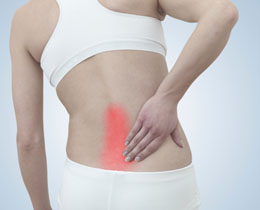Medically referred to as contained spinal disorder, intervertebral disc protrusion can occur in any part of the spine. However, this condition commonly affects the neck or the lower back. This write-up provides information on the contributing factors and treatment options for a bulging disc in the back.

The spinal cord consists of bones, which are separated by intervertebral discs. These are cartilage pads that are strong yet flexible. These heavy cartilage pads enclose a jelly-like substance. These discs facilitate bending and twisting movements of the spine, cushion the bones of the spine, and also facilitate shock absorption. As we age, these discs might degenerate owing to stress. As a result, the outer walls of any of these discs might weaken and cause the jelly-like material enclosed by the walls to bulge outwards. When the protruded disc starts pressing against the nerves of the spinal column, it can give rise to pain and discomfort.
Contributing Factors
Though the degeneration of disc is often a result of aging, a protruded disc in the back could also occur due to an injury. The disc can move out of its primary radius due to a fall from a height. Injury to the lumbar spine due to an accident or repeated trauma could also cause this spinal condition. Since, lifting heavy weights can cause strain on the vertebrae, weightlifters are quite susceptible to this condition. It is believed that excessive consumption of alcohol or excessive smoking can also increase the risk of degeneration of the discs.
A bulging disc could even develop into a herniated disc. This is a condition wherein the annulus (tough outer cover of the disc) ruptures, thereby causing the nucleus pulposus (jelly-like material) to leak out. If such a disc causes a pinched nerve in the lumbar spine, one is likely to experience lower back pain, weakness in the legs, numbness, or a tingling sensation.
Treatment Options
The treatment options will vary, depending on the severity of the symptoms experienced by the patient. The doctors might recommend the following:
Take Rest
The patient must refrain from performing any activity that might put pressure on the lower back region. Lifting heavy objects or performing any strenuous physical activity that puts pressure on the intervertebral discs in the lower back will further aggravate the condition. This can even lead to herniated lumbar disc, a more serious spinal condition.
Medication
If the disc impinges on the spinal nerves, one is most likely to experience lower back pain. Generally, painkillers are prescribed for alleviating back pain. If the oral painkillers are not providing pain relief, the use of anti-inflammatory steroid injections might be recommended. Intravenous administration of steroid injections might be recommended for reducing the inflammation or treating the irritated or pinched nerves. Application of ice packs or heating pads might also help in reducing the inflammation.
Physical Therapy
While resting the spine is an important part of the treatment, rest needs to be followed by slow and gradual mobilization. Physical therapy often forms an important part of treatment. Performing stretches and specific exercises will surely help in strengthening the back. One can also consult a massage therapist or a chiropractor for correcting the misalignment of the spine.
Surgery
If the aforementioned treatment options don't seem to help, one might be recommended to undergo a surgery. The surgery is performed under general anesthesia. It involves the removal of the disc material that is impinging on the nerve roots. The type of surgery will depend on the health and age of the patient. Laminotomy, laminectomy, percutaneous discectomy, or disc-dissolving procedures might be employed to treat this condition.
Bulging discs can sometimes affect your mobility, which is why one must take all possible steps to prevent this condition. If you are experiencing severe back pain due to a bulging disc, seek medical help and follow the advice of your doctor.
Disclaimer:
The information provided in this article is solely for educating the reader. It is not intended to be a substitute for the advice of a medical expert.


 The spinal cord consists of bones, which are separated by intervertebral discs. These are cartilage pads that are strong yet flexible. These heavy cartilage pads enclose a jelly-like substance. These discs facilitate bending and twisting movements of the spine, cushion the bones of the spine, and also facilitate shock absorption. As we age, these discs might degenerate owing to stress. As a result, the outer walls of any of these discs might weaken and cause the jelly-like material enclosed by the walls to bulge outwards. When the protruded disc starts pressing against the nerves of the spinal column, it can give rise to pain and discomfort.
The spinal cord consists of bones, which are separated by intervertebral discs. These are cartilage pads that are strong yet flexible. These heavy cartilage pads enclose a jelly-like substance. These discs facilitate bending and twisting movements of the spine, cushion the bones of the spine, and also facilitate shock absorption. As we age, these discs might degenerate owing to stress. As a result, the outer walls of any of these discs might weaken and cause the jelly-like material enclosed by the walls to bulge outwards. When the protruded disc starts pressing against the nerves of the spinal column, it can give rise to pain and discomfort.